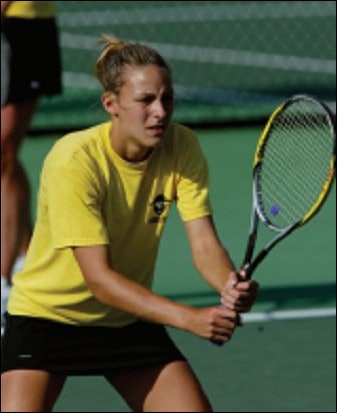Last fall's athletics restructuring scores with Vanderbilt officials, but skeptics remain

Vanderbilt University student-athletes got the news like most everyone else in the country - via a screen-bottom ticker on ESPN. What was that. Something about Vandy's chancellor eliminating the athletic department?
"We had some backlash," Commodores men's tennis coach Ken Flach recalls. "But once everybody got a reasonable explanation about what that really meant, they were OK with it."
On September 9, 2003, Vanderbilt chancellor Gordon Gee announced that intercollegiate athletics would be merged with campus recreation and wellness under the university's student-life umbrella. The phrase "athletic department" has been replaced by "athletic program" in conversation. The position of athletic director is gone, and after declining a new job title within the chancellor's office, so is seven-year athletic director Todd Turner.
In the months since that widely publicized, often-scrutinized announcement, Gee and other Vanderbilt officials have defended their stated goal - to better integrate athletics into the overall educational mission of the university - amid the skepticism of outside observers and the all-out criticism of recruiting rivals. Says David Williams, vice chancellor for university affairs and student life, "For six months, I started every presentation that I made about this with, 'Let me say three things first. One, we're not leaving Division I. Two, we were a charter member of the Southeastern Conference, and we're going to stay in the SEC. And three, not only are we not de-emphasizing athletics, we are going to emphasize it more, but it in a different way.' "
Described by Gee at the time as a declaration of war against big-time college sports, the September announcement made the reorganization appear more sudden than it actually was. According to Williams, athletics began reporting to his office back in December 2002 as part of Gee's desire to delegate more authority regarding all university matters to the university's six vice chancellors, thus freeing the chancellor to raise funds. "Quite honestly, we were concerned, even with the transfer in December 2002, that there was growing separatism between athletics and the rest of the university," Williams says.
The line between athletics and academia has been blurred in several ways since September. Competition facilities are now maintained by the same staff overseeing recreation facilities. Athletics media relations, marketing, broadcasting and public affairs are handled within the university's division of public affairs. The National Commodore Club, an athletics fund-raising arm, became the responsibility of Vanderbilt's development and alumni relations office.
While some employees survived these transitions, several middle-management positions deemed redundant were eliminated. But Gee denies critics' claims that these amount to cost-cutting measures in the guise of reform. In fact, he argues that meshing athletics into the university fabric makes subsidizing sports with university resources an easier sell. "This is part of the price of having a great university," he says. "Are we saving money? No. Are we more wise with our money? Yes. Are we targeting our money toward the students and coaches? Absolutely."
Flach has seen that commitment firsthand, with the university pledging a sizable contribution to the renovation of Vanderbilt's outdoor tennis stadium. "I'm not sure that would have happened in the past," he says.
Meanwhile, the student-athletes themselves have become more visible in everyday campus life. Williams points out that two years ago 40 incoming athletes found themselves assigned to the same one of three available freshman residence halls. A more balanced distribution is now mandated. Moving academic counseling services for men's basketball from athletics headquarters in McGugin Center to the student union proved so successful in creating casual contact between players and their non-athlete peers that women's basketball has set up its counseling shop there, too. Furthermore, surveys revealed that, contrary to popular belief, student-athletes had interest in joining other campus organizations but had trouble making the required one-year commitment. Today, student-athletes are allowed to serve six-month terms or share yearlong terms, and six student-athletes recently gained election to the previously athlete-free honor council and student conduct board.
Faculty are getting more involved, too. A fellows program is in the works, allowing individual faculty members to volunteer their time accompanying designated sports teams at practices and on road trips. "The coaches I've talked to are very excited about it," says Virginia Shepherd, professor of pathology at Vanderbilt and a respected leader on the national athletic reform front. "It creates an immediate link between them and their student-athletes and the academic side of the campus."
But Shepherd doesn't want to stop there; she envisions one day turning coaches into part-time faculty members. Personally, I would like to get coaches involved in teaching," she says. "It's a challenge at Vanderbilt, because we don't have a P.E. department and we don't offer courses in a sports-related curriculum. But we have people here with master's degrees who would love to teach counseling or psychology-type courses. I'm trying to figure out how we can get them involved in actual education during the off-season."
For now, the day-to-day lives of Vanderbilt coaches have changed little, according to Flach, and that's just fine with him. But signs of disconnect still exist. "If we do need to hire a new coach, who does that hiring? I guess David Williams. I don't know," Flach admits. "Those are the types of questions that I'm curious about."
While some initial concerns surrounding the reorganization were quelled this spring amid unprecedented athletic success - including Sweet 16 appearances for both the Vanderbilt men's and women's basketball teams and national rankings for all but one spring sports team - skeptics remain. Chief among them is Turner, who has spent the interim months offering free consultation to a dozen athletic departments while maintaining his role as chair of the NCAA committee responsible for creating the recently released package of incentives and penalties regarding student-athlete graduation rates.
Such solutions to problems facing college athletics at large are what will drive sweeping reform, Turner argues, not the actions of one school. "I really think the model that Vanderbilt has chosen, while it very well may work at Vanderbilt, has isolated the school from the processes that ultimately will change the culture," he says. "Being involved in national issues is what can really make nationwide change. Vanderbilt now doesn't have a seat at the table to do that - not without an athletic director in that role."
As for Vanderbilt's ability to effect widespread change on its own, Turner says it's too soon to tell. "It's not a matter of just a few seasons," he says. "It's going to be years before we know whether what they have done is a model to be followed by others."
Even Gee, who says the Vanderbilt model in action has so far exceeded his expectations, admits administrators on other campuses may be reluctant to stray this far from the status quo. "The issue is not whether or not they agree with us," Gee says. "The issue is whether or not they have the ability or the courage to be able to make it happen, because the forces against this kind of change are big and powerful. The very reasons that presidents can't get it done are the very reasons they have to make it happen, because university presidents are no longer in charge of athletics."
Turner, who says he has "enjoyed being a fan" since departing Vanderbilt (he traveled to Orlando, Fla., in March to see the Commodores compete in the NCAA men's basketball tournament), adds that he isn't bitter about his fate, and never has been. "I was surprised and disappointed," he concedes. "But my feelings of concern really relate to the people who are still there. They are exceptional. For that reason, I am very hopeful that this model works. There has been too much invested on the part of all those coaches, the student-athletes and the administration, and they've made too much progress. Just look at the success of the teams over the last eight months. That has nothing to do with reorganization. That has everything to do with people. And if the reorganization assists those people in reaching their goals, then I'm all for it. But if it keeps the teams from being competitive and doing the right things on and off the field, then I will be concerned."





































